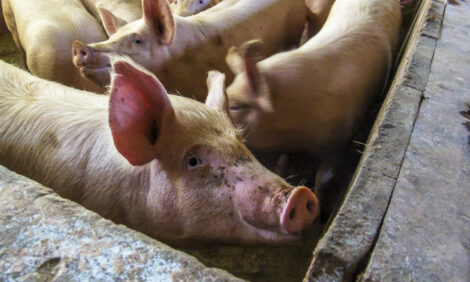



New-Generation Vaccines Offer Flexibility in Control of SIV
US - Two new-generation monovalent swine influenza vaccines — MaxiVac® H1N1 and MaxiVac® H3N2 — have been launched by Schering-Plough Animal Health Corporation and will bring added flexibility to swine producers and vets.
|
 “Each vaccine contains field-proven antigens of swine influenza virus (SIV) that have been used successfully in more than 75 million pigs nationwide,“ says Dr. Robyn Fleck, technical service veterinarian, Schering-Plough Animal Health. “Both vaccines also contain the field-proven adjuvant Emunade®.“
“Each vaccine contains field-proven antigens of swine influenza virus (SIV) that have been used successfully in more than 75 million pigs nationwide,“ says Dr. Robyn Fleck, technical service veterinarian, Schering-Plough Animal Health. “Both vaccines also contain the field-proven adjuvant Emunade®.“
The new-generation monovalents are part of the MaxiVac® family — the only SIV line with a USDA-approved label for reduced shedding of H1N1 and H3N2 flu viruses. As with all MaxiVac vaccines, MaxiVac H1N1 and MaxiVac H3N2 contain Emunade, Schering-Plough Animal Health’s proprietary oil-in-water adjuvant that has demonstrated an excellent safety record.
“Emunade has been used for over 6 years in M-Pac® mycoplasma pneumonia vaccine,“ Dr. Fleck says. “It syringes well with minimal tissue reaction. It is safe for use in weaning-age pigs and pregnant females. It also has only a 21 day withdrawal time.“
Why monovalent vaccines?
Studies show that most U.S. herds have been exposed to both H1N1 and the newer H3N2 subtypes, so many producers opt to use a product that contains both subtypes in one vaccine, such as MaxiVac® ExcellTM or the new MaxiVac® PlatinumTM, which also provides protection against mycoplasma pneumonia.Still, in some areas where either H1N1 or H3N2 is the predominant problem, producers and veterinarians still want the option and added flexibility of vaccinating for only one subtype. “Our new monovalents fill that need,“ Dr. Fleck says.
Backed by research
The H1N1 virus strain in MaxiVac H1N1 has been shown in studies to cross-react with recent U.S. isolates. The virus strain in MaxiVac H3N2 also has been carefully researched and is “genetically and serologically similar to the H3N2 viruses circulating in U.S. swine,“ she says.Both vaccines have been shown to reduce the clinical signs of swine influenza as well as viral shedding, which should reduce SIV exposure among animals and shorten the duration of disease in a herd, Dr. Fleck says.
All MaxiVac vaccines contain viruses grown in a cell-culture system. The process assures consistency in the production of antigens and helps assure that they are relatively free from foreign proteins, she adds.
Commitment to line
Palma Jordan, senior product manager of Schering-Plough Animal Health’s Pork Industry Team, says, “We’re the only vaccine manufacturer in North America offering both monovalent SIV vaccines. The availability of new-generation MaxiVac H1N1 and MaxiVac H3N2 is another example of our commitment to this line, as well as to the pork industry.“Vials of the monovalent vaccines are available in 250-dose (500 mL), 125-dose (250 mL) or 50-dose (100 mL) vials for maximum flexibility.
Each vaccine is indicated for use in healthy pigs 4 weeks of age or older. Pigs should be vaccinated with an initial 2 mL intramuscular dose and revaccinated 2 to 3 weeks later with another 2 mL dose of vaccine.
For more information about MaxiVac H1N1 and MaxiVac H3N2, call your local Schering-Plough Animal Health representative or contact the company at P.O. Box 3182, Union, N.J. 07083. Phone: 1-800-211-3573. Fax: 908-629-3485. Email:
Source: Joseph Feeks, PR Works - 21st February 2003















